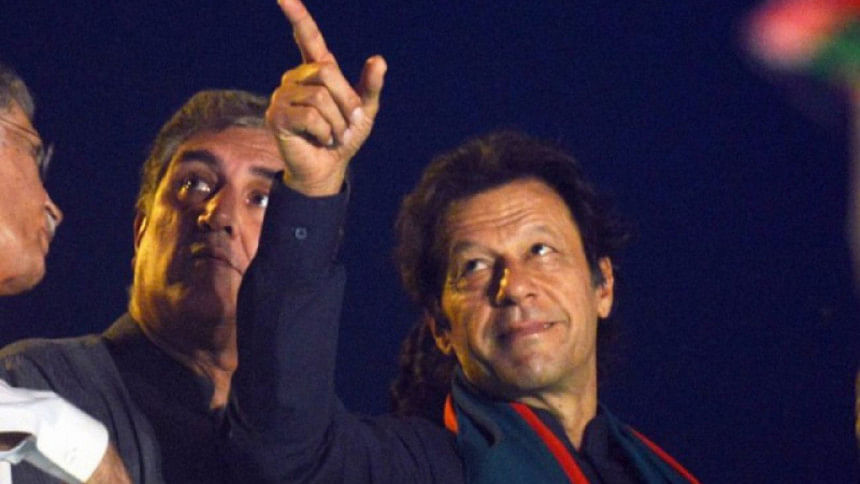Can Imran be his own man?

The Western press by and large has called the elections in Pakistan "staged managed"—meaning the military had a hand in it. Even though the EU observers attested to "free and fair" polls, inordinate delays in the transmission of results, especially the sluggish counting at an advanced stage, called the process into question.
Earlier, suspicions of interference had been fuelled by delimitation of constituencies and allegedly induced defections from Pakistan Muslim League (N) on to Pakistan Tehreek-e-Insaf (PTI). A point has also been made about presence of military men at the polling booths as if overseeing the casting and counting of ballots.
The mixed bag election outcome has three ramifications: First, Imran has had a victory that is likely to keep him from being "his own man"; secondly, PML(N) and Pakistan Peoples Party (PPP) have come out with a kind of strength that might enable them to present a sizeable front; and third, the number of Independents in the national and provincial assemblies, some with dubious antecedents of extremist disrepute, can be a power to reckon with.
Actually, it is the next better or maybe the worse thing to a "hung parliament" that has been thrown up by the July 25 Pakistan elections. An initial sigh of relief over the results not yielding a hung parliament is mutating into a concern for stable government.
There are two contradictory scenarios for the political classes of Pakistan to contend with under the shadows of a traditionally meddlesome military.
On the positive side, the numbers could help produce a more or less balanced government with a strong opposition to provide for checks and balances.
On the negative side, the results can and are inducing jugglery of different permutations and combinations among PML(N) and PPP to keep Imran out of power.
But Imran has emerged as a national figure pushing his adversaries into regional folds; they will have scores to settle. He will have the first call to form a government but it has got to be a coalition government—his mandate will have to come from an alignment of forces: The parties or individuals he coalesces with will demand their pound of flesh.
All in all, it appears that the Pakistan Army has kept aces up its sleeves which they can use when political leadership strays out of their trajectory.
Ben Judah in an exclusive interview with Imran Khan in The Sunday Times magazine of February 4, 2018, asked, "What does Khan say to the accusation he is the military's man?"
"What is it that the military is doing wrong that I have backed?" Imran snapped.
Ben Judah then asked: "Is the military corrupt?"
"The military depends on the head of military", said Khan. "He is in my opinion, the best head of military we have ever had. He's really a good guy."
Benazir Bhutto, once told Christina Lamb, the much-acclaimed war correspondent and senior columnist of The Sunday Times, "I have won the election, but I have no power."
Since his 2016 campaign, Trump has been criticising Pakistan for "sapping billions of dollars without return." Imran's reply is something to this effect: "You created the Mujahadeen to fight the Soviet Union leaving terrorists in the region; we are wasting billion dollars with casualties among our people and soldiers."
Military chiefs are said to have visited White House on the invitation of the head of the country's chief executive, such was the extent of sidelining political authority by the US establishment.
Imran's election plank had a two- pronged thrust: Anti-corruption campaign and an inclusive attitude to fundamentalist clerics and the Taleban. The Army shared the same line of thinking. But the electorate of Pakistan thought differently; they didn't let the far-right candidates win as they had wished.
Clearly this election in Pakistan was held on a different wicket; the cricketing hero is perhaps the best civilian face to bank on for a military faced with geopolitical challenges. Conflict—laden rhetoric cannot be the staple Pakistan's foreign or domestic policies.
Our hope is that the Pakistan Army would extend the fullest cooperation to the new government so that factious and polarised politics is overcome fostering stability in Pakistan.
It will be important for the powers that be to disprove Cristina Lamb's famous quote: "Countries have an army but Pakistan army has a country."
Shah Husain Imam is adjunct faculty in East West University, a commentator on current affairs and former Associate Editor, The Daily Star.
Email: [email protected]





Comments